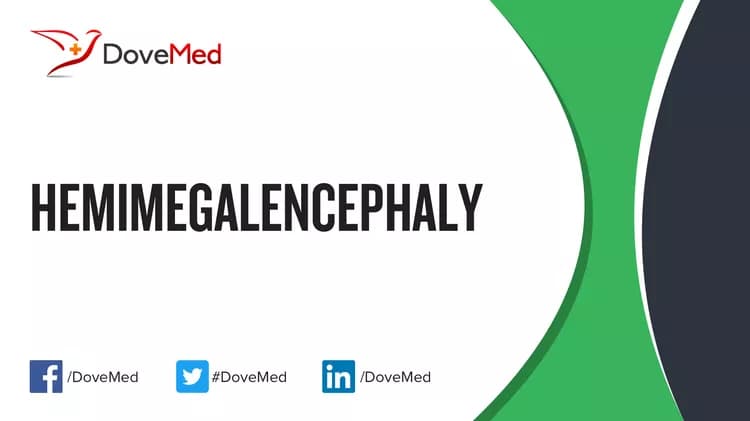What are the other Names for this Condition? (Also known as/Synonyms)
- Macrencephaly
- Unilateral Megalencephaly
What is Hemimegalencephaly? (Definition/Background Information)
- Hemimegalencephaly is a rare malformation involving one side of the brain. It may occur alone or in association with other syndromes, such as Proteus syndrome, tuberous sclerosis, linear sebaceous nevus syndrome, neurofibromatosis, Sturge-Weber syndrome, or Klippel-Trenaunay syndrome
- Children with this disorder may have a large, asymmetrical head accompanied by seizures, partial paralysis, and impaired cognitive development
- Because the seizures associated with Hemimegalencephaly are difficult to treat with anticonvulsant medications, a surgery called hemispherectomy is often the most successful treatment
- The cause of Hemimegalencephaly is not fully understood, but involves a disturbance of cells early in development and likely involves genes involved in patterning and symmetry
(Source: Hemimegalencephaly; Genetic and Rare Diseases Information Center (GARD) of National Center for Advancing Translational Sciences (NCATS), USA.)
Who gets Hemimegalencephaly? (Age and Sex Distribution)
- Hemimegalencephaly is a rare congenital disorder. The presentation of symptoms may occur in infancy
- Both males and females may be affected
- Worldwide, individuals of all racial and ethnic groups may be affected
What are the Risk Factors for Hemimegalencephaly? (Predisposing Factors)
- A positive family history of Hemimegalencephaly, in isolation or with the following syndromes may be an important risk factor, since Hemimegalencephaly can be inherited:
- Klippel-Trenaunay syndrome
- Linear sebaceous
- Neurofibromatosis
- Nevus syndrome
- Proteus syndrome
- Sturge-Weber syndrome
- Tuberous sclerosis
- Currently, no other risk factors have been clearly identified for Hemimegalencephaly
It is important to note that having a risk factor does not mean that one will get the condition. A risk factor increases one’s chances of getting a condition compared to an individual without the risk factors. Some risk factors are more important than others.
Also, not having a risk factor does not mean that an individual will not get the condition. It is always important to discuss the effect of risk factors with your healthcare provider.
What are the Causes of Hemimegalencephaly? (Etiology)
The cause of Hemimegalencephaly is not fully understood, but involves a disturbance of cells early in development and likely involves genes involved in patterning and symmetry.
(Source: Hemimegalencephaly; Genetic and Rare Diseases Information Center (GARD) of National Center for Advancing Translational Sciences (NCATS), USA.)
What are the Signs and Symptoms of Hemimegalencephaly?
The signs and symptoms of Hemimegalencephaly may include:
- Large asymmetrical head
- Impaired cognitive development
- Partial paralysis
- Seizures
If Hemimegalencephaly is associated with a syndrome, then signs and symptoms of the syndrome may also be present.
How is Hemimegalencephaly Diagnosed?
Hemimegalencephaly is diagnosed on the basis of the following information:
- Complete physical examination
- Thorough medical history evaluation
- Assessment of signs and symptoms
- Laboratory tests
- Imaging studies
- Biopsy studies, if necessary
- Tests to diagnose an underlying disorder, if any present
Many clinical conditions may have similar signs and symptoms. Your healthcare provider may perform additional tests to rule out other clinical conditions to arrive at a definitive diagnosis.
What are the possible Complications of Hemimegalencephaly?
The complications of Hemimegalencephaly may include:
- Severe psychomotor retardation
- Seizures resistant to anticonvulsant medications
Complications may occur with or without treatment, and in some cases, due to treatment also.
How is Hemimegalencephaly Treated?
- Because the seizures associated with Hemimegalencephaly are difficult to control with anti-epileptic medications, most patients undergo surgery to separate one hemisphere of the brain from the other (hemispherectomy)
- There are several surgical options to consider:
- Functional hemispherectomy, which involves severing the nerves and tissue connecting one side of the brain to the other, leaving the brain within the skull.
- A complete or anatomic hemispherectomy, in which the affected side of the brain is surgically removed
- These surgeries are usually performed by a neurosurgeon with experience treating epilepsy syndromes. Over time, the remaining side of the brain may take over the functions lost
(Source: Hemimegalencephaly; Genetic and Rare Diseases Information Center (GARD) of National Center for Advancing Translational Sciences (NCATS), USA.)
How can Hemimegalencephaly be Prevented?
Currently, Hemimegalencephaly may not be preventable, since it may be genetic disorder.
- If there is a family history of the condition, then genetic counseling will help assess risks, before planning for a child
- Active research is currently being performed to explore the possibilities for treatment and prevention of inherited and acquired genetic disorders
Regular medical screening at periodic intervals with tests and physical examinations are recommended.
What is the Prognosis of Hemimegalencephaly? (Outcomes/Resolutions)
- The prognosis of Hemimegalencephaly is dependent upon the severity of the signs and symptoms and associated complications, if any
- Individuals with mild conditions have better prognosis than those with severe symptoms and complications
- Typically, the prognosis may be assessed on a case-by-case basis
Additional and Relevant Useful Information for Hemimegalencephaly:
The following DoveMed website link is a useful resource for additional information:
Related Articles
Test Your Knowledge
Asked by users
Related Centers
Related Specialties
Related Physicians
Related Procedures
Related Resources
Join DoveHubs
and connect with fellow professionals


0 Comments
Please log in to post a comment.